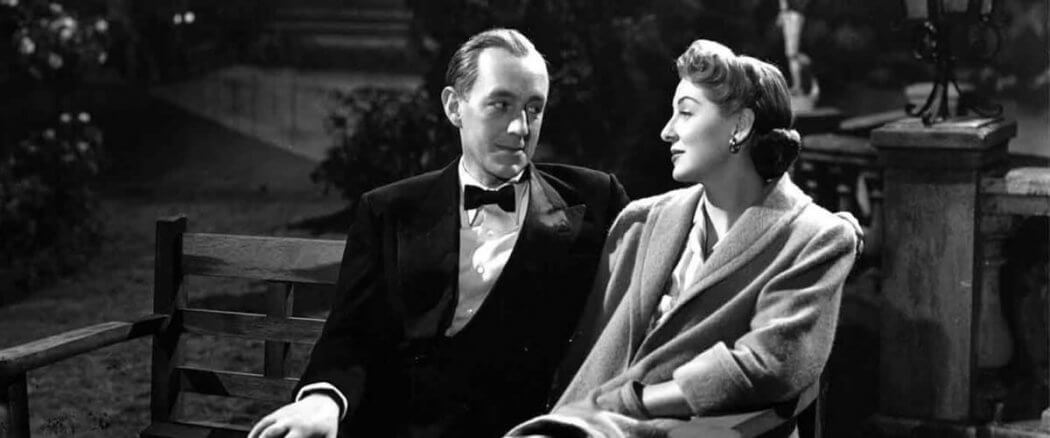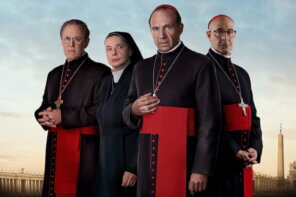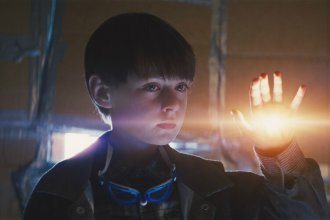“Pity The Blind,” the sign entreats, hung around the neck of a violinist, his eyes closed, as he plays a poignantly displacing melody; the notes are fitful and accepting, braided into a single cord that pulls you, meekly, steadily. This will be the key to Last Holiday, but we don’t know it yet.
We also don’t know that the violinist is not blind, until after George Bird (Alec Guinness) slides a coin in the slotted can and he opens his eyes and winks. Bird is stupefied, not because of the arch deception, but because it’s as if the violinist is already aware: Bird has just been diagnosed with a fatal illness, so who’s pitying who?
Fate Fixed
Lampington’s Disease is the infirmity fatale, and allow me to rest your Google eyes: it is not a real disease. But in Last Holiday, it is very real, and when Guinness, “a nobody [who] could be anybody,”* is informed, he absently, urgently deforms his hat in his hands, staring at the Doctor with eyes that seem to be both widening and shrinking right in front of ours.
By the time Guinness reaches the door and grasps the frame to turn and say, “It’s going to be all over before I’ve even got properly started,” his voice is high and breathy, the words coming in bursts, like a child playing a pipe organ – and we are ready to go with him until the end, even before the end of the first scene.
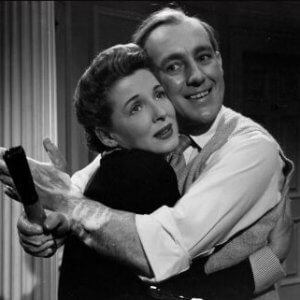 With Bird’s fate fixed, he looses the rest of his life, quitting a job he hated, emptying his accounts, buying a one-way ticket to the privileged Pinebourne, booking a room at the exclusive Regal hotel, buying new suits. If you’ve seen the endearing and declawed 2006 remake starring Queen Latifah, you may presume to know this film’s trajectory, but trust me, it’s a shopping cart with a screwy wheel that will not go in the direction you expect.
With Bird’s fate fixed, he looses the rest of his life, quitting a job he hated, emptying his accounts, buying a one-way ticket to the privileged Pinebourne, booking a room at the exclusive Regal hotel, buying new suits. If you’ve seen the endearing and declawed 2006 remake starring Queen Latifah, you may presume to know this film’s trajectory, but trust me, it’s a shopping cart with a screwy wheel that will not go in the direction you expect.
“You’ve come to something big,” a tailor remarks to Bird. “And how do I know? It’s the look in your eye. A special look. And what does it tell me?” “It tells you I’ve come into something big,” Bird replies. “Quite so. But how big is it?” The tailor asks. “I don’t know,” Bird responds, “nobody knows. Or if they do know, they’ve never told us properly. And I’m leaving for it in the morning.” The “something big” is really somethings: the Regal hotel, and death itself. One destination is just as definite as the other.
The Compassion of J.B. Priestly
There is no indication the writer of Last Holiday, J.B. Priestly, was Christian, though he did venerate the values of religion – but he was a socialist, and in 2015, that engenders approval from most of the liberal Protestant church. Throughout Priestly’s work, the passion for socialism seems propelled by a compassion for people. In An Inspector Calls, his masterpiece, that compassion curdles into condemnation, righteous though it may be. However, in Last Holiday, it is simply as subtle and omnipresent as the staff of the Regal, who are no less fascinating, complex, attractive and troubled as the guests. And all of them are intrigued by George Bird.
“You’re already regarded here as a sort of mystery man, whatever that means,” the housekeeper, Mrs. Poole, apprises Bird, after she deduces from fragmented comments that he has drained his savings for a drink of High Life. “Now that you are here, don’t creep about looking apologetic. Be a mystery man, or anything else you want to be. And tell ‘em what you think. It’ll do ‘em good.”
Truth to Power
Usually I cringe at the phrase “Christ figure,” just as I do at “The Daniel Diet,” or any other idea that reduces the Bible to a sewing pattern for clothing a body we do not have yet. Nevertheless, it is tantalizing to employ the former here.
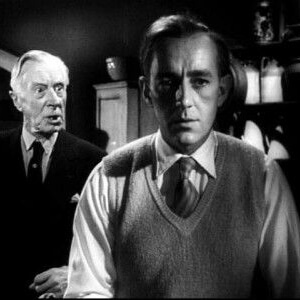 Moving between upstairs and downstairs, Bird’s attitude and demeanor announce a new reality, where class is irrelevant, wealth is immaterial and truth must be spoken to power. He lectures a visiting cabinet minister on how to empower domestic farmers, abides the staff’s labor strike and rallies the hapless guests to run the hotel and prepare dinner for themselves. A guest, filling in for the receptionist, tells a caller that children are welcomed; in a previous scene they were not permitted. The kingdom is here, and the king of the feast, George Bird, raises a glass and declares, “we haven’t just passed the time, we’ve filled it with something good.”
Moving between upstairs and downstairs, Bird’s attitude and demeanor announce a new reality, where class is irrelevant, wealth is immaterial and truth must be spoken to power. He lectures a visiting cabinet minister on how to empower domestic farmers, abides the staff’s labor strike and rallies the hapless guests to run the hotel and prepare dinner for themselves. A guest, filling in for the receptionist, tells a caller that children are welcomed; in a previous scene they were not permitted. The kingdom is here, and the king of the feast, George Bird, raises a glass and declares, “we haven’t just passed the time, we’ve filled it with something good.”
But a prophet is not without honor except in his hometown, and – although Bird is not a prophet, just a man with a deadline – when he has finally made himself at home, the staff and guests begin to turn on him, at, of course, a last supper. They have reasons, which I will not disclose so as to preserve your first experience of the film, but suffice to say the newness fades and the normal obligations start nagging again. For a while they saw, but now they do not.
Save for Mrs. Poole (Kay Walsh), the housekeeper, always Bird’s biggest fan, though she didn’t always understand. In the final scene, a garden at night, Walsh steps away from the hotel, her whole body conveying the soul, overwhelmed with sorrow, of one that truly believed in this mystery man, who came from somewhere else.
______________________________________
*Roger Ebert in his review of Kind Hearts and Coronets (1949).

